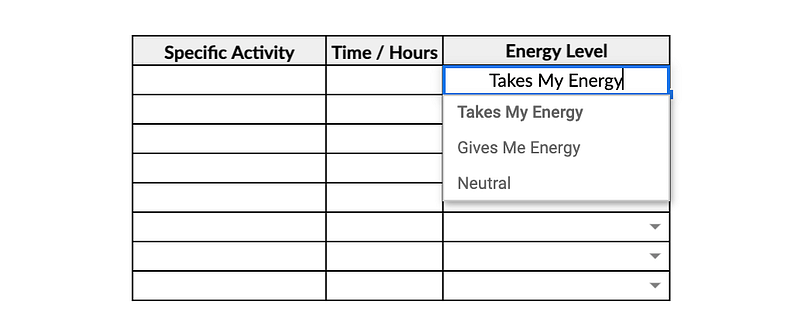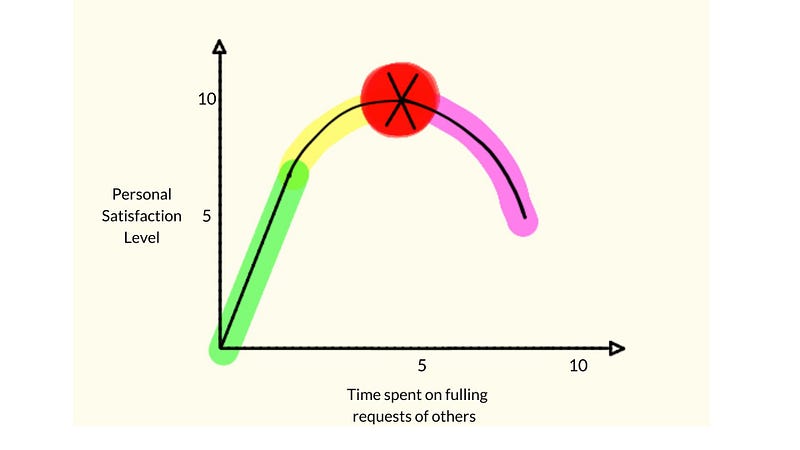A step-by-step guide to bold decision making.

You are on a career path.
The question is: Is this path also the one you want to be on?
Do you make a living with something worth your time?
Does your work allow you to live the life you want to live?
To live the life you choose to live?
Most people were lured into their current career path. Parents, friends, and employer branding guided their decisions.
But unless you decide what to do for a living, you’re like a ship without a sail. Or as Gary Vaynerchuk puts it:
“The one thing I know for sure, is the outcome of what happens if you don’t decide. If you never make a decision, or deliberate for too long, all the upside or potential opportunity could be lost.”
My life changed once I took ownership of my career path. Since that decision, every minute of my time became precious. I want to be on the path I’m on.
If I can do it, you can do it, too.
Once you know what you want, you can land any job you want.
Here’s how you can boldly decide what to do for a living:
0) Get Into “Peak State”
How you start something determines how you finish it. No person made great decisions while feeling like a douche-bag.
A low-quality state of mind leads to low-quality choices.
But you shouldn’t settle for mediocre choices.
You deserve the best.
That’s why you want to be in a peak state when you think about your next move.
So before you consider making a decision, check whether you’re in a state to thinking this decision through. Put yourself in an environment that supports your clear, open mind. Get into a peak state.
How to apply this advice
If you have a powerful, ritualized morning routine, you’ll be in peak state right afterwards. The time frame after your routine is excellent for altered thinking and decision making.
Another way to peak state is to get your body moving and breathing. More oxygen equals more energy. Hike through a forest, or simply breathe fresh air before you sit down.
1) Determine Your Orbit
Be selective about how you spend your time.
Rather than asking what’s possible, ask which topic is worth dedicating your life to?
You have the skills. You have the knowledge. Your life is precious. But eventually, you will die.
Your lifetime is too precious to remain within the limited boundaries of your existing reality.
To make bold, right decisions, think outside of your current environment.
How to apply this advice
Which topic makes you want to jump out of bed at any time? What issue can’t you stop thinking or talking about?
There’s no wrong answer to it. Don’t even think about what other people think about your answer. There’s no right or wrong answer. Be honest with yourself.
If you can’t find anything, it comes down to two reasons. You’re not in your peak state, or you need more inspiration. Make learning a daily habit. Read books outside of your habitue. Visit meet-ups. Travel.
There’s no valid reason not to have any topic you burn for.
Find out what that topic is for you.
2) Analyze Your Energy Level
“The energy of the mind is the essence of life.”
— Aristotle
Two days, packed schedules.
Have you ever wondered at night, why on some days you feel drained and wasted, while on other evenings you’re still feeling fresh?
Your energy level determines how you experience your days, weeks, years, and ultimately, your life.
Yet, most people don’t have any clue about their energy drainers and givers. They never pay any attention to our energy. Our ignorance doesn’t protect us.
You won’t make smart decisions on what to do for a living unless you’re clear about your energy management.
How to apply this advice
Before you look for “what’s out there,” make sure you know “what’s inside” of you. Regularly ask yourself:
- Which activities make you feel good and give you energy?
- Which activities destroy your mood and drain your energy?
Once you pay attention, you’ll quickly realize different activities lead to different energy levels.
Feel free to copy this simple table to your journal or in your notepad and fill it for a week. You’ll be clear about energy givers and takers afterward.

After tracking and rating your activities, consolidate what you’ve learned. Here’s my general energy list. Notice that yours might be completely different.
Energy drainers: Repetitive tasks, hour-long computer work, detail-oriented tasks like filling spreadsheets, meetings with >5 people, PowerPoint, reading law texts, spending time with negative people, greasy food, WhatsApp, grocery shopping, driving a car
Energy givers: Teaching, writing, public speaking, networking, strategic planning, helping others, reading philosophy, self-reflection, organizing, music, time with my partner, laughing with friends, singing, meditation, ashtanga yoga, dancing, sunshine, cooking and then eating self-made dishes, driving in trains
When reading job descriptions or making job choices, we often forget what’s behind the fancy title. “Digital Transformation Consultant” might mean nothing more than sitting in front of a computer, building powerpoints, or sales pitches 3/4 of your time. “Customer Relationships” might equal sitting in front of a computer and inserting contact details into a spreadsheet. “Human Resource Specialist” might be another term for being on the phone with requiters and scheduling interviews for potential candidates.
Before deciding on a career path, be clear about your energy drainers and givers.
3) Focus On Growth
“Certainty is the enemy of growth. “
— Mark Manson
When making your decision, focus on personal growth.
By working a job where you can acquire the skills for your future self, the chances are high that you’ll overperform.
Not because you’re smarter than your co-workers. It’s because you have a reason why you chose that career: Growth.
Pick work where you learn what you want to learn.
How to apply this advice
Where do you see yourself five years from now?
Which skills does your future self possess?
Only then think about your current reality and identify the gap from where you stand to where you want to become.
Your future job should, at least to some extent, help you bridging the skill gap.
4) Trust Your Intuition
“The more you trust your intuition, the more empowered you become, the stronger you become & the happier you become.”
— Gisele Bündchen
Intuition is your body’s intelligence at its best. Your brain takes in any given situation, searches its files, matches past experiences, and cues from your self to send you a feeling.
This process happens so quickly that you don’t even register it on a conscious level. That’s why intuition simply points out the way without being in your logical, rational mind.
When was the last time you felt like you just know something?
Intuition exists in all of us. The more we learn about it and listen to it, the more we can use intuition to shape our decisions for the better.
How to apply this advice
Sit down in a quiet environment and ask yourself: What does my gut say on what to do for a living?
Then, listen.
Silence your rational voice.
Don’t start to justify and explain your feelings.
You’ll notice your intuition once you’re really listening.
Does this mean you should follow intuition blindly? No. Factor in common sense and a tickle of rationality, and you’ll find the optimal balance for bold and reach your best decisions.
5) Ask Specific Questions to Your Network
“Nobody can give you better advice than yourself.”
— Cicero
Having a strong network is powerful. So powerful, it can even interfere with your trajectory.
It’s tempting to follow smart people’s general opinions.
“What’s my next career step?” is a terrible question to ask your network.
You’ll find yourself living their imagination of a good life. You might sway into a choice that doesn’t work for you.
Regardless of your network’s size and quality, be very selective and specific with the questions you ask.
How to apply this advice
Instead of asking your network, consult yourself first. Before approaching any friend, colleague, or mentor for advice, be clear about your orbit, your energy management, your future self, and your intuition.
Then, come up with specific questions, like:
Do you know any job in _______ (your orbit) where I can deploy my _______ (activities that give you energy) and expand my ________ (skills you want to grow)?
Once you have a specific question, find the person that can give you the best answers to your questions.
If you aren’t satisfied with your opponent’s answer, finish with: Who else do you know in _____ (orbit) I could talk to regarding this question?
6) Invest In Your Decision
“An investment in knowledge pays the best interest”
— Benjamin Franklin
Once you made a decision, it’s tempting to overthink. But the more you think about your decision, the more you talk yourself out of it.
We, humans, love to stick to what we know. Your rational mind doesn’t like big changes and might find ways to question your decisions.
The best way to make a decision is by putting high stakes into your decision.
Once you spend time and money on your decision, you’re signaling yourself that you’re serious about it.
How to apply this advice
Put effort into realizing your decision and invest in the decision you made.
Your initial investment is your time. But don’t just browse through books and articles. Invest time in crafting your application. Ask for intros to your future employer.
Besides, make a financial investment. Get a mentor. Go to conferences. Pay for learning experiences like online courses. Apply what you learn in the form of action.
The further you’re in, the less likely your ego will talk you out of it (because it’s generally afraid of everything new and outside of your comfort zone).
The Bottom Line
Get into a peak state, determine your area, analyze your energy level, focus on personal growth, ask and listen to your intuition, ask specific questions to your network, and invest time and money in your decision.
You’ll be blown away by everything that happens in your life, once you made a bold decision on what you want to do for a living.
Just watch the power of life unfold.
Do you want to stay in touch? Join my E-Mail List.


